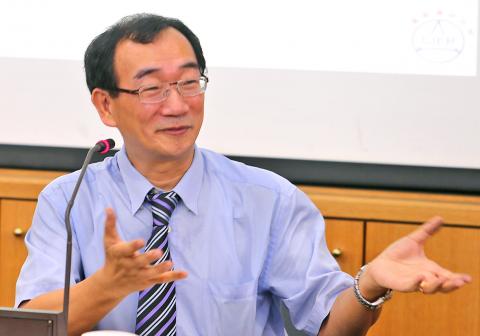The Chung-Hua Institution for Economic Research (CIER, 中華經濟研究院) yesterday cut its forecast for GDP growth for this year to 3.04 percent, down from the 3.56 percent it projected in April, as a global economic slowdown, especially in China, affects exports.
However, academics who joined the discussion challenged the institution’s new forecast, saying it would be difficult — if not impossible — for the economy to expand 3 percent this year and the government should focus its resources on improving domestic demand.
Exports, which drove more than 70 percent of GDP growth in the first quarter, are predicted to grow 3.88 percent this year, sharply down from a prior estimate of 6.26 percent growth, the CIER report showed.

Photo: CNA
“The second half may put up a weaker performance compared with the first half owing to a higher base,” CIER researcher Peng Su-ling (彭素玲) told a media briefing.
GDP growth likely reached 3.11 percent in the first half of the year, but could decelerate to 2.97 percent for the rest of the year, with major economies proving to be weaker than expected, Peng said.
Slowing global growth is unfavorable to Taiwanese exports, which contracted 7.1 percent in the first half, the report said.
Taiwanese exports to major trading partners, notably China and Southeast Asian nations, are declining, while South Korea is gaining market share, the report said.
The trend suggests declining competitiveness among local exporters, Peng said.
To make things worse, China is reducing its dependence on imports of electronic components from Taiwan, as it builds up its own supply chain as part of its economic restructuring, Peng said.
On the currency front, the New Taiwan dollar has risen 2.67 percent versus the US dollar so far this year, while the yen and the won have retreated 1.89 percent and 1.5 percent respectively over the same period, Peng said.
A strong NT dollar is eroding exporters’ bottom lines, he said.
Government agencies are looking for ways to boost the nation’s exports and the economy as a whole, with some academics suggesting establishing a sovereign wealth fund to help finance social welfare spending and others calling for the establishment of a more investment-friendly environment.
Bills Finance Association (票券公會) chairman Hermann Wu (吳正慶) said that he and his peers doubt the economy can grow by 3 percent this year.
National Central University economics professor Chiou Jiunn-rong (邱俊榮) suggested that the government focus its efforts on strengthening domestic demand to support economic growth.
However, he added that the government gives too much importance to GDP figures.
“GDP growth may not improve or reflect the well-being of the public the way a wage increase does,” Chiou said.

PREPAREDNESS: Given the difficulty of importing ammunition during wartime, the Ministry of National Defense said it would prioritize ‘coproduction’ partnerships A newly formed unit of the Marine Corps tasked with land-based security operations has recently replaced its aging, domestically produced rifles with more advanced, US-made M4A1 rifles, a source said yesterday. The unnamed source familiar with the matter said the First Security Battalion of the Marine Corps’ Air Defense and Base Guard Group has replaced its older T65K2 rifles, which have been in service since the late 1980s, with the newly received M4A1s. The source did not say exactly when the upgrade took place or how many M4A1s were issued to the battalion. The confirmation came after Chinese-language media reported

A Ministry of Foreign Affairs official yesterday said that a delegation that visited China for an APEC meeting did not receive any kind of treatment that downgraded Taiwan’s sovereignty. Department of International Organizations Director-General Jonathan Sun (孫儉元) said that he and a group of ministry officials visited Shenzhen, China, to attend the APEC Informal Senior Officials’ Meeting last month. The trip went “smoothly and safely” for all Taiwanese delegates, as the Chinese side arranged the trip in accordance with long-standing practices, Sun said at the ministry’s weekly briefing. The Taiwanese group did not encounter any political suppression, he said. Sun made the remarks when

The Taiwanese passport ranked 33rd in a global listing of passports by convenience this month, rising three places from last month’s ranking, but matching its position in January last year. The Henley Passport Index, an international ranking of passports by the number of designations its holder can travel to without a visa, showed that the Taiwan passport enables holders to travel to 139 countries and territories without a visa. Singapore’s passport was ranked the most powerful with visa-free access to 192 destinations out of 227, according to the index published on Tuesday by UK-based migration investment consultancy firm Henley and Partners. Japan’s and

BROAD AGREEMENT: The two are nearing a trade deal to reduce Taiwan’s tariff to 15% and a commitment for TSMC to build five more fabs, a ‘New York Times’ report said Taiwan and the US have reached a broad consensus on a trade deal, the Executive Yuan’s Office of Trade Negotiations said yesterday, after a report said that Washington is set to reduce Taiwan’s tariff rate to 15 percent. The New York Times on Monday reported that the two nations are nearing a trade deal to reduce Taiwan’s tariff rate to 15 percent and commit Taiwan Semiconductor Manufacturing Co (TSMC, 台積電) to building at least five more facilities in the US. “The agreement, which has been under negotiation for months, is being legally scrubbed and could be announced this month,” the paper said,